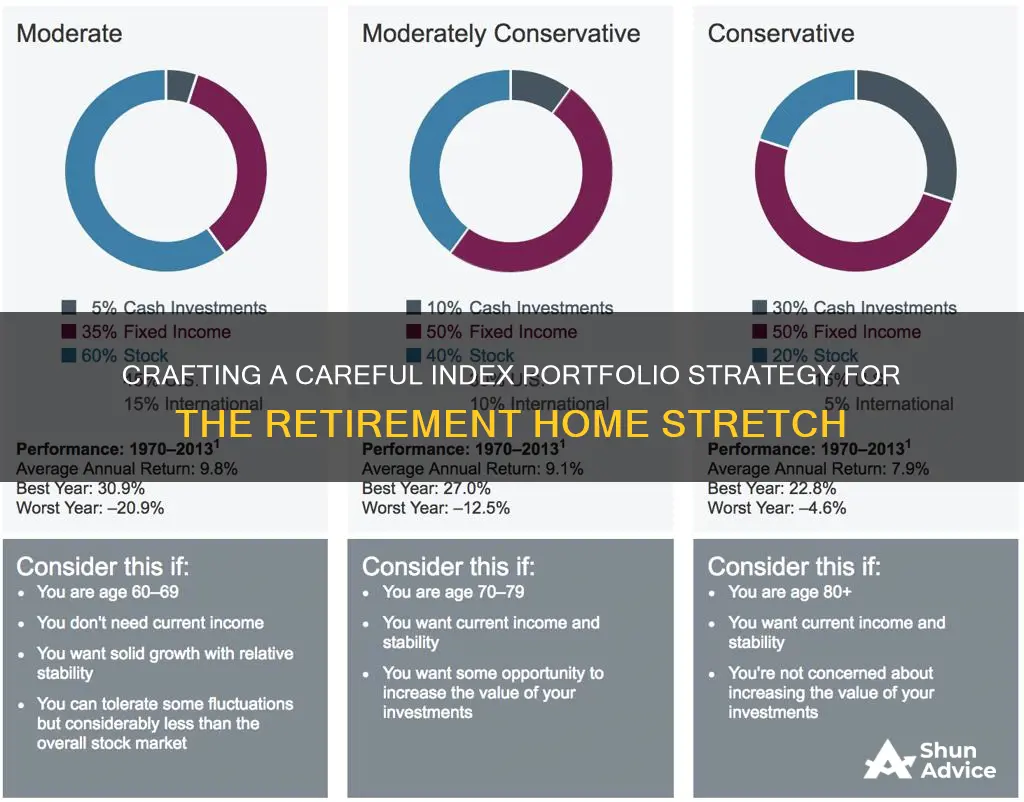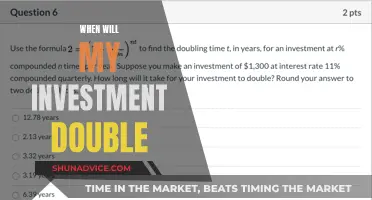
Index funds are a great investment for building wealth over the long term, which is why they're popular with retirement investors. Index funds are a type of mutual fund or exchange-traded fund (ETF) that aims to replicate the performance of a specific market index, such as the S&P 500. They are considered a passive management strategy, which means they don't need to actively decide which investments to buy or sell. This makes them less expensive than actively managed funds, which try to beat the market but very rarely do.
Index funds are also more diversified than actively managed funds, which means they can provide a more stable income stream for retirees. When building an index investment portfolio for retirement, it's important to assess your financial goals, risk tolerance, and income requirements. You should also consider the fund's historical performance, expense ratio, and tax efficiency. Additionally, it's crucial to regularly review and rebalance your portfolio to maintain the desired asset allocation.
| Characteristics | Values |
|---|---|
| Investment portfolio | The sum total of all your investments across various accounts |
| Investment portfolio composition | Stocks, bonds, exchange-traded funds (ETFs), mutual funds, commodities, futures, options, and even real estate |
| Investment accounts | Employer-sponsored plans (e.g. 401(k)s), IRAs (traditional, Roth, SEP, SIMPLE), taxable brokerage accounts, robo-advisor accounts, cash in savings, money market accounts, or certificates of deposit (CDs) |
| Time horizon | The duration of your investment plan, e.g. from the present until retirement |
| Risk tolerance | The amount of volatility in the value of investments that an individual is willing to accept |
| Active vs. Passive Management | Active management results in higher investment returns but higher transaction fees compared to passive management |
| Asset allocation | The mix of holdings by asset class and type, e.g. stocks, bonds, cash, etc. |
| Diversification | Investing in a variety of asset classes to reduce risk |
| Rebalancing | Periodically adjusting the investment portfolio to maintain the desired asset allocation |
What You'll Learn

Index funds vs. mutual funds
When building an investment portfolio for retirement, it's important to understand the differences between index funds and mutual funds. Mutual funds refer to a fund's structure, while index funds refer to its investment strategy. Many index funds are structured as mutual funds, and vice versa. However, they have distinct characteristics that are important to consider when making investment decisions.
Index funds are known for their passive investment approach, aiming to match the performance of a particular market index, such as the S&P 500. They are considered a form of passive investing, as they require less human intervention and are often seen as less volatile due to their diversified nature. Index funds are typically associated with lower fees since they are not actively managed, and they can be structured as mutual funds or exchange-traded funds (ETFs).
On the other hand, mutual funds are a broad class of investment funds that follow various investing strategies. They are actively managed, meaning a fund manager actively makes investment decisions and tries to beat the market. Mutual funds provide investors with a diversified portfolio and are suitable for those seeking higher-than-average returns. However, the active management of mutual funds leads to higher fees, which can impact overall returns.
When deciding between index funds and mutual funds, it's essential to consider factors such as management style, investment objectives, costs, and risk tolerance. Index funds offer a more passive approach with lower fees, while mutual funds provide the potential for higher returns but come with higher costs. Additionally, the level of diversification and tax advantages may differ between the two.
When nearing retirement, it's crucial to evaluate your financial goals, risk tolerance, and investment horizon. A well-diversified portfolio that includes a mix of stocks, bonds, and other assets can help maintain stable and reliable investment returns. As you approach retirement, shifting your focus towards income and capital preservation becomes important, and actively managed funds may provide higher returns during certain market conditions. However, the fees associated with active management can impact long-term returns, and a set-and-forget approach with index funds may be more suitable for some investors.
US Investment Trends: Where's the Money?
You may want to see also

How index funds work
Index funds are a type of investment that tracks the performance of a specific market index, such as the S&P 500 or the total US stock market. They are designed to match the returns of their underlying index, which is diversified enough to avoid major losses and perform well over time. Index funds are often comprised of mutual funds or exchange-traded funds (ETFs) that hold a variety of investments, typically stocks or bonds.
Index funds are a passive form of investing, meaning they follow a set of rules to automatically buy or sell assets according to the changes in the index. This is in contrast to active investing, where a fund manager decides when to buy or sell specific investments. The passive nature of index funds helps to keep costs and fees low, which can improve returns for investors.
- Pick your exchange: Choose an exchange that aligns with your risk tolerance and investment goals. For example, the NASDAQ focuses on growth stocks and tends to be more aggressive, while the Dow and S&P 500 are less volatile.
- Pick your fund: Select a fund provider such as Vanguard, Fidelity, or Charles Schwab, which offer a wide variety of index funds to choose from.
- Open an investment account: The account-opening process is typically quick and can be done online. Take brokerage fees and other costs into account when making your choice.
- Monitor and adjust: While index funds are typically long-term investments, it is wise to periodically review your portfolio to ensure it aligns with your financial goals and make adjustments as necessary.
Index funds offer several advantages, including diversification, low costs, and minimal maintenance for the investor. They provide a simple and cost-effective way to gain exposure to a broad range of stocks or bonds. However, they also have some drawbacks. Index funds cannot beat the market since they only aim to match its performance. They may also lack the flexibility to pivot away from unfavourable markets and may not reflect the true value of the companies in the index.
Overall, index funds can be a good choice for investors seeking low-cost, diversified, and passive investments. They are ideal for long-term investing and have become a staple in many investment portfolios. However, it is important to consider your investment objectives and risk tolerance when choosing an index fund and always seek personalised advice from a financial advisor.
Amenities: Where to Invest?
You may want to see also

Why invest in index funds
Index funds are a great investment option for those nearing retirement. Here are some reasons why:
Low Fees and Costs
Index funds are passively managed, meaning they aim to mirror the performance of a specific market index without actively picking securities or timing the market. This passive management strategy results in lower fees and expenses compared to actively managed funds. Index funds typically have lower expense ratios, which are charged as a percentage of the assets under management. The low costs associated with index funds can lead to higher returns over time, as fees eat into investment gains.
Broad Diversification and Reduced Risk
Index funds provide broad market exposure and diversification across various sectors and asset classes. By investing in an index fund, you can own a diverse range of stocks or bonds, reducing the risk associated with individual stock picking. Diversification helps smooth out volatility and lowers the chances of significant losses if a particular company or sector underperforms.
Long-Term Performance and Historical Returns
Index funds have consistently outperformed actively managed funds over the long term. The S&P 500, for example, has an average annual return of nearly 10% over the long term. While past performance doesn't guarantee future results, index funds have historically delivered solid returns, making them attractive for retirement savings.
Tax Efficiency
Index funds are tax-efficient due to their lower turnover rates. They generally don't generate as much taxable income as actively managed funds because they buy and sell holdings less frequently. This results in fewer capital gains distributions, making them more tax-efficient, especially for retirement accounts.
Simplicity and Ease of Use
Investing in index funds is straightforward and doesn't require extensive knowledge or effort. You can rely on the fund manager to mirror the performance of the underlying index. Index funds offer a simple, passive investment strategy, allowing you to build wealth over time without the need to become a stock market expert.
In summary, index funds offer a low-cost, diversified, and passive investment option with strong historical performance. They are an excellent choice for those nearing retirement who seek a simple way to gain exposure to a broad range of stocks or bonds while keeping costs low.
Investing: A Personal Choice
You may want to see also

Diversifying with index funds
Index funds are a group of mutual funds that are designed to track a specific index, like the S&P 500. They are popular because they often have low fees and offer a variety of stocks and bonds. When you buy even one share of an index fund, you own every stock in the index.
The number of funds in a diversified portfolio matters less than apportioning assets to a wide variety of asset classes. For example, you could own 10 funds, all from one sector, and lack a diversified portfolio.
- Choose multiple indices within the same asset class: Each index has its own rules for construction, and those rules don't necessarily thrive in the same environment. For example, if you have an index fund that focuses on US funds, adding an internationally-based fund will lessen your risk and broaden your prospects.
- Invest in several sector funds: If one sector doesn't perform well, chances are another will. For example, if your oil fund doesn't perform well, your technology fund might.
- Be careful not to duplicate holdings: Make sure you know what each fund invests in so you don't duplicate holdings. For example, investing in an oil fund would duplicate some of the stocks in an energy fund.
- Focus on broad-market index funds: Your goal is to own the market, not beat the market. Over time, very few actively managed funds manage to do better than low-cost index funds that simply try to replicate the market's overall performance.
- Consider a three-fund portfolio: This simple approach creates a diversified retirement savings plan by focusing on stocks (one US fund and one international) and bonds (one US fund).
- Diversify across asset classes: Make sure your overall portfolio has a mix of US and international funds, small to large companies, and both growth and income funds.
Why People Invest: Unlocking Motivations
You may want to see also

Quick start guide: How to invest in index funds
Understand the Basics
- Index funds are a type of mutual fund or exchange-traded fund (ETF) that aims to replicate the performance of a specific market index, such as the S&P 500.
- Unlike actively managed funds, where fund managers actively select investments to try and outperform the market, index funds follow a passive management strategy by holding a diversified portfolio of securities that mirror the constituents of the target index.
- Index funds are considered a more simple and cost-effective option compared to actively managed funds, as they require less research and analysis.
- They are also less risky than individual stocks as they are diversified across multiple securities.
Know the Benefits
- Index funds often perform better than actively managed funds over the long term because they match the market's performance.
- They are also less expensive since they have lower fees due to their passive management strategy.
- Index funds are a great way to balance the risk in your investment portfolio as they tend to be less volatile than individual stocks.
- They provide diversification benefits by allowing you to invest in a variety of asset classes, sectors, and companies of different sizes.
Set Clear Goals
Before investing in index funds, understand your financial goals and risk tolerance.
- Index funds are generally suitable for long-term wealth-building, especially for retirement savings.
- If you are seeking short-term gains or are willing to take on more risk, other investment options like individual stocks or cryptocurrencies may be more appropriate.
Research and Choose Index Funds
When selecting index funds, consider the following:
- Company size and capitalization: Choose between small, medium, or large-cap index funds.
- Geography: Decide if you want to focus on domestic or international stocks, or a combination of both.
- Business sector or industry: Select funds that target specific sectors like technology, healthcare, or consumer goods.
- Asset type: Index funds are available for various asset classes, including bonds, commodities, and cash.
- Market opportunities: Explore funds that focus on emerging markets or other growing sectors.
- Costs: Compare the fees and expense ratios of different index funds, as lower costs can significantly impact your long-term returns.
Decide on a Brokerage or Mutual Fund Company
You can purchase index funds directly from a mutual fund company or a brokerage.
Consider factors such as fund selection, convenience, trading costs, impact investing options, and commission-free offerings when choosing a provider.
Make Your Purchases
To purchase index funds, you'll need to open an investment account such as a brokerage account, individual retirement account (IRA), or Roth IRA.
- Decide on the amount you want to invest, keeping in mind the investment minimums and account minimums.
- Choose the specific index fund(s) you want to buy based on your research and goals.
- Monitor your index funds over time to ensure they are performing as expected and make adjustments if necessary.
Stay Informed and Patient
- Understand that index funds are a long-term investment strategy, and short-term market fluctuations are normal.
- Stay informed about the performance of the underlying index your fund is tracking and compare it to your fund's returns.
- Remember that passive management doesn't mean you should completely ignore your investments. Regularly review and rebalance your portfolio as needed.
Consider Seeking Professional Advice
If you are unsure or need assistance, consider consulting a qualified financial advisor. They can provide personalized guidance based on your unique circumstances and goals.
Invest or Repay Student Loans: Navigating the Financial Crossroads
You may want to see also
Frequently asked questions
An index fund is a type of mutual fund or exchange-traded fund (ETF) that aims to replicate the performance of a specific market index, such as the S&P 500. The fund's portfolio mirrors the constituents of the underlying index it tracks. For example, an index fund tracking the S&P 500 would hold shares of all the companies listed in the index, with each stock's weight proportional to its representation in the index.
Index funds follow a passive management strategy, aiming to track the performance of a specific market index. Unlike actively managed funds, index funds do not try to beat the market but rather aim to replicate its composition and returns. This is achieved by holding a well-diversified portfolio of securities that closely mirrors the constituents of the target index.
Index funds offer several benefits. Firstly, they are less expensive than actively managed funds as they require less research and analysis. Secondly, index funds typically carry less risk than individual stocks due to their diversification. Lastly, index funds often perform better than actively managed funds over the long term, providing better returns for investors.
When selecting index funds, consider the following factors:
- Dividend Yield: Prioritize funds with a strong emphasis on dividend-paying stocks or bonds, as these tend to have higher dividend yields.
- Expense Ratio: Choose funds with lower expense ratios to keep costs low and maximize returns.
- Historical Performance: Evaluate the fund's track record over multiple market cycles to gauge its ability to deliver consistent returns.
- Index Composition: Assess the diversity and exposure of the underlying index to ensure it aligns with your income objectives and risk tolerance.
- Fund Size and Liquidity: Larger funds tend to have lower tracking errors and higher trading volumes, making them more suitable for investors who need quick access to their funds.







